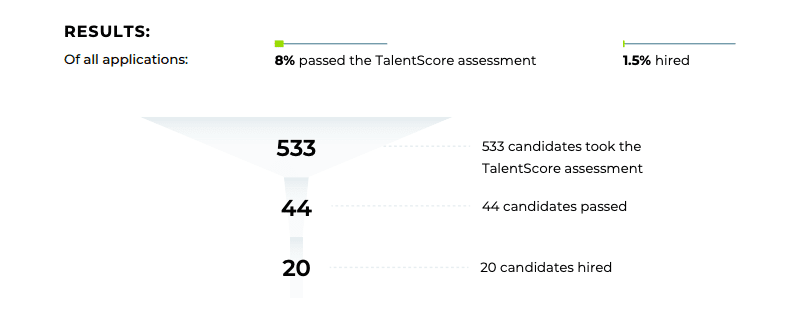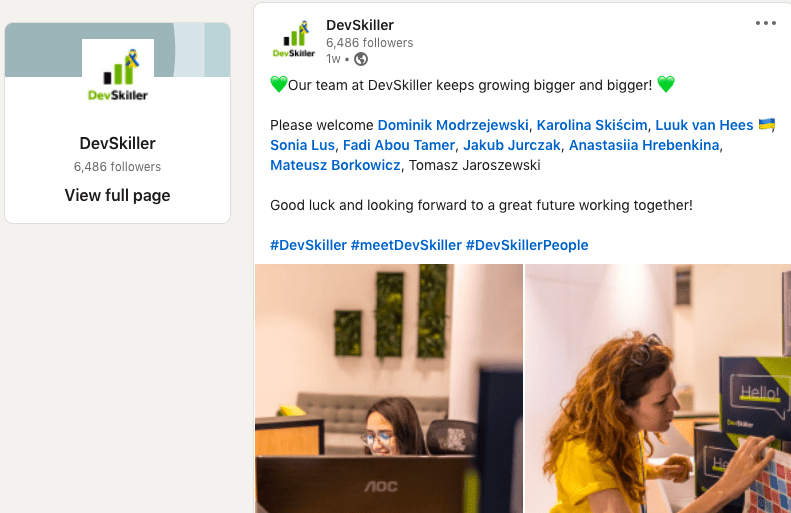
Candidate selection tips for effective tech recruitment

The candidate selection process in technical recruitment can be tricky. The market for technical hires is fiercely competitive. As a result, sourcing tech candidates who will be the right fit for your company is not an easy task. Hiring managers need to do all they can to ensure their candidate sourcing methods will offer them the best chance of success. The following candidate selection tips can help.
How to improve the candidate selection process?
It is essential to make sure your IT & HR teams cooperate throughout the technical hiring process. You’ll need everyone pulling in the same direction. The following are guidelines that can help you get to where you need to be.
- Have a clearly defined job description
- Refine your candidate selection process
- Implement pre employment assessments
- Fast-track top candidates
- Promote your employer branding
- Look to reskill employees in-house
- Expand your talent-pool
Clearly defined job description
Writing a job description is one of the most integral parts of tech recruitment. To be able to find candidates who are the best talent available during the candidate sourcing process, you need to first, clearly define the role.
Specify the technologies
Be specific about the technologies in which you need your candidate to excel. List only the main technologies used by your company. Don’t make it a wishlist of every technology you would ideally like them to know, only the basics that are essential for doing the job.
Define core skills
Fonte: Netguru
There are essential, core competencies that every candidate will need to possess to be able to undertake the role. There may be many skills that can be taught on the job, but certain core skills will be essential to know from the start.
Define the project & the team
Here, you lay out the aim of the project the candidate is hiring for. How big the team is, and the hierarchy of the company, including the candidate’s position within the current setup.
Be realistic
During the employee selection process, be careful to only compare candidates against the role, and not against each other. You are looking for who has the required skills based on the description you laid out.
Also, don’t look for a perfect candidate. It’s unlikely you’ll find someone who exceeds in every area. Find someone who is capable and willing to learn, and teach them what they don’t already know.
Refine your candidate selection process
“A significant numbers of candidates drop out at every stage of the recruiting process, not just during application.” – Ere.net
Information gathered by Glassdoor suggested that 80% of job applicants drop out during the recruitment process. A staggeringly high amount. That means that it isn’t enough to simply attract the right candidates into your pipeline using your job description—you also have to keep them there.
An inefficient selection process is one of the most common reasons given for candidate drop-off. Refining your hiring process can be one of the most effective ways to keep candidates in the pipeline.
Take the example of TPay, who implemented DevSkiller TalentScore into their recruitment process. They were able to refine their lengthy candidate selection process and cut down on candidate drop-off—read the full TPay case study
“TalentScore makes our hiring screening process much faster. We’ve doubled the
team in one year, as we focus our interviewing processes on the candidates who
have real potential. ”

Read – How to reduce candidate drop off rate in tech
How to cut down a lengthy recruitment process?
- Explain the length of your recruitment process to your candidate so they know what to expect.
- Implement automated pre-employment tests to screen candidates. Make quicker hiring decisions, and cut down on unnecessary interviews
Explain the length of your recruitment process
“96% of candidates will apply for jobs at a company they know will keep them informed during the application and interview process.”—Fortune magazine via Glassdoor
It can be frustrating for candidates who receive no word from a hiring team on how well they performed during the recruitment process. Receiving regular updates is a surefire way to keep your best candidates engaged.
In the technical hiring industry, in particular, good candidates won’t wait around for your company to make a hiring decision. You need to inform the candidate, after every stage, what will happen next and how long the recruitment and selection process is likely to take. Being informed also adds to a positive candidate experience and promotes your employer brand as a company that is organized, honest, and approachable.
Speed up your hiring process
It’s important to understand that you don’t need a lot of candidates to be part of the application process. Too much resume screening can actually lead to slow hiring decisions and a longer overall process.
What you need, is to have a process that is efficient enough, to be able to make a fast hiring decision. A more efficient resume screening process that leaves only the best candidates remaining. The trick is to work out quickly who the best candidates are.
Reading a candidate’s resume during the screening process is not sufficient to be able to assess real skills. This may suffice in certain industries, but not in tech. A candidate’s academic background does not necessarily reflect their practical coding skills and job performance.
Candidate screening through automated employment tests
Automated employment assessments can be much more effective than screening resumes. Screening tools like DevSkiller TalentScore are a fast and effective means of testing a developer’s cognitive ability, general mental ability, and most importantly, their practical coding skills.
TalentScore’s automated employment tests use the RealLifeTesting™ methodology to simulate the real working environment of a candidate and provide a complete picture of a candidate’s on the job performance. Tests are sent out automatically and tailored to suit the needs of your company. Finally, screened candidates have an assessment of their work carried out automatically.
Find out if your company is ready for tech screening
This is a simple but extremely effective step that can be introduced to cut down the length it takes to make hiring decisions. Keeping candidates in your pipeline for longer. Overall, this adds to a most positive candidate experience.
The DevSkiller IT skills report 2022, found on average, a developer takes only 2 days and 16 hours to complete a TalentScore pre-employment assessment. Meaning that, two days after the candidate first applied for the role, a hiring manager can have already assessed the candidate’s level of competency and can eliminate any candidates who are not up to the required level.
Sending out tests and the assessment happens automatically, meaning that the hiring manager can reduce the number of unqualified candidates in the pipeline, without really having to do much at all. This frees up their time to begin interviewing the candidates who passed the assessment in the first few hours. The whole recruitment and selection process moves along at a much quicker pace than if the hiring manager was still relying on whiteboard assessments.
Fast track top candidates

One way to ensure not to let great candidates slip through the cracks is to fast-track the most qualified candidates through the recruitment pipeline. This is useful because if you think they’re the most qualified candidate, chances are another company does as well, and they are waiting to pounce.
How to fast-track candidates
Fast-tracking candidates means identifying the most promising candidates and moving them through the pipeline as quickly as possible. There are several ways to do this.
Identifying the best candidates as soon as possible will, of course, help you here. This is where developer screening assessments can come into their own. They can identify immediately, who from your talent pool, are the ones to fast-track.
However, you can fast-track the process for the best candidates in other ways. video interviews, for instance, became common during the Covid pandemic of 2020, but now that the world is returning to normal, many companies are returning to in-person interviews. Video interviews require less time on the past of the candidate, and so it can often be easier to arrange these than in-person interviews. They can also mean less time spent in interviews for hiring managers as well.
Focus on one hiring stage at a time
Another way to fast-track your hiring process is to focus on one stage of recruitment at a time. Meaning that it is often quicker to post a job ad to several sites at once. Then once you have an array of responses, move into the screening stage, and then into the interview stage. Rather than interviewing one candidate while still accepting applications from another. The reason this is quicker is you can focus all your attention on one aspect of the pipeline at a time.
“If there are candidates in multiple stages, it’ll drag out the hiring process and you could potentially lose qualified candidates.” —recruiter.com
Fast-tracking the best candidate makes for a much better candidate experience. They will be impressed by the efficiency of the process, and more likely to invite candidates they know from elsewhere, to apply for future openings.
Developer screening tests also sidestep the difficult issue of unconscious bias, in that the tests are automated and the results speak for themselves.
Employer branding
Employer branding is crucial for effective candidate selection. Why? Because in tech recruitment more than in any other industry, it is not only the company involved in the selection process. The candidate has to choose the company as well.
There is such a wealth of positions open to tech candidates, that they can often afford to be picky about the roles they take on. Meaning your company really has to go all out, to sell itself as a great place of employment.
“Too many job descriptions are focused solely on what the company wants from its candidates. But hiring is a two-way street — and candidates want to know what they’ll get out of the role too.” —Linkedin
This is where employer branding comes in. Your job advertisement shouldn’t only be telling a candidate what you require from them. It should also be telling them what you have to offer.
Find out from other members of your team, what they like about the company and what attracted them to the role. This might be something you can use as part of your employer branding.

DevSkiller employer branding through social media – Source: Linkedin
How to ensure your employer branding is strong?
“84% of job seekers consider the reputation of a company important in their decision on joining.” —Papirfly
Your current employees can be great advocates for your brand. If they are happy at your company then encourage them to say so—on LinkedIn, or to friends in similar companies. Even appearing as a guest in an online discussion or speaking at a conference, means that your employees are acting ambassadors for your brand.
Unity in the workplace
Togetherness is a pick part of employer branding. It’s important that your company be seen to all be pulling in the same direction. With unified goals in mind. These goals need to be put in place at the very top of your organization and reinforced all the way down the ladder. This togetherness, the feeling of belonging to something collective and bigger than yourself, is an appealing aspect of company branding. It is something that might seem appealing to a prospective employee.
To achieve this, your company’s goals need to be clear and succinct. They should be displayed on your company’s website and in the company’s mission statement.
Read – How to build a strong employer brand in tech
What makes your company stand out from the competition?
Something else to consider is what makes your company stand out? If your competitors are all selling the same product as you, what is the thing that makes your company unique? This is your company’s USP, which will not only help to sell your product to your customer but also sell your company to potential employees. The goal is to think of things that will improve the candidate experience for your potential hire, so they choose you.
When writing job advertisements with employer branding in mind, it is worth mentioning:
- Your company’s moral and social standing.
- Anything that makes your place of work seems appealing
- If you run an annual charity fundraiser or support projects in the community
- If your company has an active social calendar—regular team building events, a weekly trivia quiz, or a monthly wine & cheese evening.
Whatever the event or cause your company supports, these are the details that might just persuade a sought-after developer, that your company is the best one to be part of.
Candidate selection in-house

One crucial, and often overlooked, aspect of effective tech recruitment, is candidate sourcing within the workplace. Having an effective internal hiring process can be your key to success.
Just as some technical skills become more in demand over time, others can become less important. Meaning you may have technical workers in your company whose skills are going to waste. The solution to this problem is to hire internally and reskill e upskill current employees.
This was echoed in the World Economic Forum, Future of Jobs report 2020,
“The share of core skills that will change in the next five years is 40%, and 50% of all employees will need reskilling,”—and that was already two years ago.
Not only is reskilling a chance for candidate sourcing from right under your nose, but it is also an opportunity to reinvigorate the work lives of your past employees. Many of them, might be feeling bored and in need of a new challenge. It means, that not only do you fill the gaps in your team, but you also retain the workforce you already have. This can further help your employer branding, as it is a good sign to any news starters if the team around them has been with you for many years.
Expand your talent-pool

One thing the pandemic of 2020 did for the tech industry, is to push the trend of remote-working into hyperdrive. According to SmallBizGenius, in the US, “18% of people work remotely full-time.”
That figure rises to 34% when working a full-time job where one or more days are worked from home.
This has presented a great opportunity for technical hiring managers. With so many employees working remotely, the talent pool of where to find the best candidates has widened exponentially. As a technical recruiter, expanding your talent pool can be the secret to your candidate selection woes.
Now, applicant sourcing, candidate screening, and scheduling interviews can all happen online. This means, that if you are struggling with candidate selection locally, you can simply source candidates from elsewhere. Technology is already beginning to boom in places like Africa, as a result.
‘Tech funding in Africa grew faster than any other region globally in 2021, reaching a total of $5.2 billion.”—eMarketer
Summary
The candidate selection process in tech is a difficult skill to get right. With the right tools and processes in place, there’s no reason why your company can’t make great hire after great hire.
Take steps to automate the parts of your process that require the most physical work. When it comes to resume screening, employment assessments can be implemented that are easily automated. This allows you to quicken up hiring decisions and avoid candidate drop-off.
Take steps to make sure your current employees are the best ambassadors of your employer brand. Ask your workforce how satisfied are they in their roles? Ask yourself, could some of these workers find new satisfaction by being reskilled in the role you are trying to fill?
Remember to widen your talent pool so that your candidate selection process covers a wide area when sourcing. Finally and perhaps most importantly of all, once you have the right candidate, don’t let them slip away. Fast-tracking candidates to the finish line is one of the best ways to make sure you hire the best tech talent.
Download the Essential guide to technical hiring success here!




